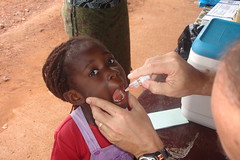National Immunization Days in India

On February 11, India kicks off their next round of immunization activities for polio eradication. Leaders Dave Groner (Michigan) and Ann Lee Hussey (Maine) are with a team of thirty that hail from a mix of geographical areas - Alaska, Colorado, Virginia, Michigan, Illinois, Florida, California, Hawaii, Maine, Canada and Sweden. The team has spent the past two days in Delhi receiving updates and briefings on the current status of the polio eradication program in India from the World Health Organization office as well as Rotary International's PolioPlus office. This has been in preparation for their upcoming participation in NID activities in the north of Uttar Pradesh and in the state of Uttaranchal. The team will be divided into five groups when they travel to their homestay visits over the next two days to the cities of Yamunangar, Chandigarh, Dehradun, Roorkee and Haridwar. Members will work at the immunization booths on the 11th and work with the local health departments in the door-to-door follow-up on the 12th and 13th.
In preparation the team has also been visiting Rotary Clubs in Delhi and viewing their projects, visiting schools geared toward integration of handicapped children, and a local hospital offering corrective surgery to polio patients.
We have learned that the challenges facing the eradication program in India are the high population number, the high population density, malnutrition, lack of clean water, lack of sanitary systems, stomach viruses that challenge the children's immune system regularly interfering with absorption of the vaccine, corrupt bureaucracy at the lower level, complacency and lack of interest after battling the polio virus for so many years. India is the only place in the world where all of the above challenges are together in one place.
We have also learned that there appears to be a cycle spiking an outbreak and spread of polio every four years. The good news is that each spike is smaller than the last and each low count of polio cases in the three years following, is smaller than the previous three year lows. Progress is being made and there is an optimism that the polio virus can be eradicated from India within the next two years or less. The use of the monovalent vaccine in certain hotbed areas of polio outbreaks curbs the spread by producing stronger immunity faster.
Our team is anxious to get to work. The state of Uttaranchal reported 13 polio cases last year as opposed to one the year before. We look forward to being a part of stopping the spread of such a crippling disease. We are anxious to lend our help to local Rotarians and local health workers and will work as ambassadors for the Polio Eradication Initiative. It is our hope that we can renew enthusiasm for the program in the areas where we travel and let India know of the support they have in other areas of the world.
Together we will work for a polio free India!
Namaste,
Ann Lee Hussey
In preparation the team has also been visiting Rotary Clubs in Delhi and viewing their projects, visiting schools geared toward integration of handicapped children, and a local hospital offering corrective surgery to polio patients.
We have learned that the challenges facing the eradication program in India are the high population number, the high population density, malnutrition, lack of clean water, lack of sanitary systems, stomach viruses that challenge the children's immune system regularly interfering with absorption of the vaccine, corrupt bureaucracy at the lower level, complacency and lack of interest after battling the polio virus for so many years. India is the only place in the world where all of the above challenges are together in one place.
We have also learned that there appears to be a cycle spiking an outbreak and spread of polio every four years. The good news is that each spike is smaller than the last and each low count of polio cases in the three years following, is smaller than the previous three year lows. Progress is being made and there is an optimism that the polio virus can be eradicated from India within the next two years or less. The use of the monovalent vaccine in certain hotbed areas of polio outbreaks curbs the spread by producing stronger immunity faster.
Our team is anxious to get to work. The state of Uttaranchal reported 13 polio cases last year as opposed to one the year before. We look forward to being a part of stopping the spread of such a crippling disease. We are anxious to lend our help to local Rotarians and local health workers and will work as ambassadors for the Polio Eradication Initiative. It is our hope that we can renew enthusiasm for the program in the areas where we travel and let India know of the support they have in other areas of the world.
Together we will work for a polio free India!
Namaste,
Ann Lee Hussey


0 Comments:
Post a Comment
<< Home